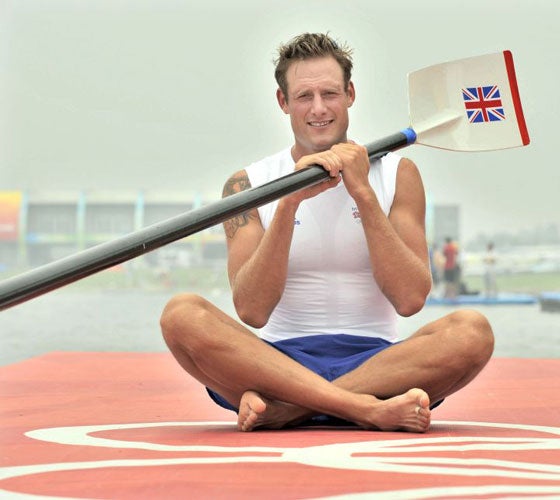Heathcote lays down gun to join marines
The Sandhurst graduate has swapped tours of duty in Iraq for a place in the British eight after a fellow soldier got him back in the boat, writes Paul Newman in Beijing

Your support helps us to tell the story
From reproductive rights to climate change to Big Tech, The Independent is on the ground when the story is developing. Whether it's investigating the financials of Elon Musk's pro-Trump PAC or producing our latest documentary, 'The A Word', which shines a light on the American women fighting for reproductive rights, we know how important it is to parse out the facts from the messaging.
At such a critical moment in US history, we need reporters on the ground. Your donation allows us to keep sending journalists to speak to both sides of the story.
The Independent is trusted by Americans across the entire political spectrum. And unlike many other quality news outlets, we choose not to lock Americans out of our reporting and analysis with paywalls. We believe quality journalism should be available to everyone, paid for by those who can afford it.
Your support makes all the difference.Sport loves its military metaphors. Players and athletes go into battle, fight for their lives and shoot down their opponents. For Alastair Heathcote, however, the language of war is a way of life. For the last seven years he has been a soldier in the British Army, though he has been released from duties for the last 18 months to concentrate on his ambition to win an Olympic rowing gold medal.
Heathcote is a member of the British eight, who have high hopes of success next week. If his rowing life has been less stressful than an Army career that has included tours of duty in Bosnia and Iraq, he has nothing but admiration for his colleagues on the water. "There are some guys in the Army who would just collapse with some of the training we've done," Heathcote said yesterday.
"It's so tough. You can't really do anything other than train, eat and sleep. You don't have the energy to do it. There's no way that you could combine it with a job outside rowing because you just couldn't recover. You'd grind to a halt."
At 30 Heathcote is one of the older members of the British team and relishing an opportunity that he thought had long passed him by. Seven years ago, having failed to get beyond the fringes of the national squad, he gave up rowing to join the Army.
After graduating from Sandhurst and spending three years in some of the world's most dangerous trouble spots, he had all but forgotten about competitive sport until two years ago. Then Robin Bourne-Taylor, who had rowed at the Athens Olympics, joined the tank gunnery school in Dorset where Heathcote was an instructor and persuaded him to join a quest to win a place in Beijing.
In January of last year the two soldiers were invited to train with the national squad and by the summer both were members of the British eight that won bronze at the world championships in Munich. Both are here, though Bourne-Taylor is now rowing in the pair rather than the eight.
"I'm one of the few guys in the squad who has done something other than rowing over the last 10 years or so," Heathcote said. "It does make for a different perspective on things, though military life is so different to this that you can't really compare the two."
Bourne-Taylor's soldier girlfriend was killed by a roadside bomb in Iraq last year, while Heathcote, with classic British understatement, recalls incidents in Basra that "weren't at all nice".
He explained: "We were going in after suicide bombers had struck. Two or three bombers actually hit targets when we were there. It wasn't pleasant at all, but Sandhurst does do an incredible job to prepare you for those things and my tour of Iraq was actually much better than the previous one our guys had been on. And compared to the hand-to-hand fighting that our people are having to deal with in Afghanistan at the moment it wasn't bad."
Heathcote said the toughest time he had had was in his earliest days in the Army, when he was sent on a course because of "character defects" that had been identified.
"They said I was too laid back and questioned my commitment," he said. "The course was like a boot camp. When you arrived you had everything taken away from you – your keys, mobile phone, any books, any food you had. You were never told what you were going to be doing next.
"At three in the morning you could be bundled on to a truck and taken for a week into the Scottish hills. On the exercises you weren't given any food, you had no sleep and were made to deal with crazy, crazy things. It was a very tough time. They wanted to see what you were made of."
They soon discovered what the former Eton pupil was made of. Heathcote finished top of the class and a successful Army career followed, though he will be moving on after the Olympics, taking a four-month break to decide what to do with the rest of his life.
"I have a few ideas – teacher, rowing coach, going to university to do medicine – though I don't quite know what I'll do yet," he said.
Heathcote will leave without regrets. "I've enjoyed my time in the Army immensely. I wouldn't change it for anything. If I'd got into the national rowing squad in 2001 I wouldn't have joined the Army and had all that experience. I'm very glad that I did. I think it's provided me with all sorts of skills for later life."
Join our commenting forum
Join thought-provoking conversations, follow other Independent readers and see their replies
Comments